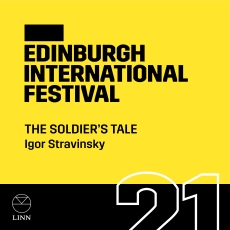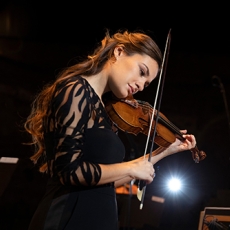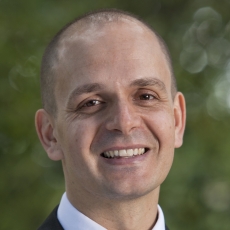Nicola Benedetti - Stravinsky: The Soldier's Tale - Bach Track
The Soldier’s Tale, once called “Stravinsky’s jazz Faust”, tells of an unwitting pact with the Devil, a book that tells the future, and a magical violin representing the soul of a soldier on leave, which he bargains away for useless riches. So a post-financial crisis yarn, but one with new relevance, for this small-scale piece of theatre, dance and music, was created for a travelling outdoor troupe. Ironically, despite recent prominence since its tiny ensemble can be safely distanced, its first tour was cancelled by the 1918 flu pandemic.
The “open- air” structure serving as the Edinburgh International Festival’s main concert venue is a very long tunnel-like ‘tent’ – imagine a grounded Zeppelin cut in half lengthways – with open sides allowing air to circulate, and about 35 distanced rows of seats. For those of us at the back of this hangar, there is an expertly judged audio system, which gives the illusion that all the sound, which never sounds amplified, is coming directly from a group of performers one can barely see. Those at the front would have seen familiar faces from opera, TV and concert halls, for rarely has so distinguished a group been assembled to give this work live; it would have shone as a highlight even in a normal year of visiting foreign ensembles and performers.
Stravinsky’s instrumental ensemble of high and low of each instrumental family – so violin and double bass, clarinet and bassoon, cornet and trombone – adds just one musician to handle the bass drum, two snare drums, field drum with snare release, triangle, tambourine and cymbal. Percussionist Louise Godwin performed heroics in managing the many subtle effects, the driving march rhythms and the closing solo. Her splendid colleagues were familiar principals from Britain’s orchestras. In such an ensemble piece it is hard to pick out individuals, but the sweet liquid sounds of Maximiliano Martín’s clarinet and Ursula Leveaux’s bassoon were delightful in their solos and in duet, while the tricky florid writing in the cornet part of the Royal March was played by Phil Cobb not just with precision but with fluid expression.
Of course the key role is given to the violin, and even in this group Nicola Benedetti counted as luxury casting. This was billed as her final performance as the EIF’s 2021 resident artist. The soldier’s fiddle has magical powers, and so it seemed did Benedetti’s playing, enchanting not only the characters in the drama, but also those of us there just to witness Satan’s triumph.
There was no dancing on view (I think), but the actors captured the “naïve-yet-sophisticated” everyman aspect of the drama. Anthony Flaum’s gullible Soldier was pitiable in the right sense, taken in even when his initial reaction was a wary one. The Devil was Siobhan Redmond, who, having often on television played a temptress, took naturally to the role of The Tempter. Sir Thomas Allen as the narrator was an engaging raconteur, telling the familiar tale as if none of us could know what was to happen. He was quite untroubled by the loud rainstorm that fell briefly during the performance, simply cupping his hands around his open mouth in mock bellow. That downpour might mean that the second performance later in the day will be used for the online film (available from Friday 27the August).


